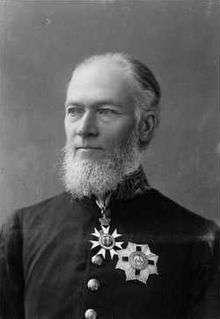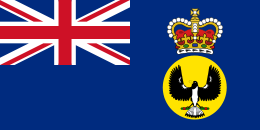Sir Thomas Buxton, 3rd Baronet
| Sir Thomas Buxton, Bt GCMG DL | |
|---|---|
 | |
| 13th Governor of South Australia | |
|
In office 29 October 1895 – 29 March 1899 | |
| Monarch | Victoria |
| Premier | Charles Kingston |
| Preceded by | The Rt. Hon. Earl of Kintore |
| Succeeded by | Lord Tennyson |
| Personal details | |
| Born | 26 January 1837 |
| Died | 28 October 1915 (aged 78) |
| Nationality | British |
Sir Thomas Fowell Buxton, 3rd Baronet, GCMG DL (26 January 1837 – 28 October 1915), commonly referred to as "Sir Fowell Buxton",[1] was the Governor of South Australia from 29 October 1895 until 29 March 1899. He was the grandson of Sir Thomas Fowell Buxton, a British MP and social reformer, and the son of Sir Edward North Buxton, also an MP.
He attended Harrow School and Trinity College, Cambridge.[2] He married Lady Victoria Noel on 12 June 1862 and they had a total of 13 children, ten surviving infancy. She was crippled by a spinal condition in 1869.
He was elected as Liberal Member of Parliament (MP) for King's Lynn at the 1865 general election, but was defeated at the 1868 election.[3] After his defeat, he stood again for Parliament unsuccessfully on several other occasions: in Westminster at the 1874 general election, in Western Essex at the 1880 general election and at the by-elections in Northern Norfolk in 1876 and 1879.[3] He was appointed High Sheriff of Norfolk in 1876.
When Buxton was appointed governor, the Premier of South Australia, Charles Kingston was angry that the South Australian government had not been involved in the decision about who should be the new governor, so made life as hard as possible for Buxton and his family. The governor's allowance was reduced and customs duty was charged on their household items (including his wife's invalid carriage). Buxton took up the job anyway, and later was described as the most genial, sociable and common-sense governor, due to his gentle and unassuming friendliness. He visited gaols and hospitals, and showed genuine interest in Aboriginal culture during his time as governor. He eventually returned to England due to the ill health of his wife.[4]
Their second son, Noel Buxton acted as aide-de-camp to his father as governor, and later was a human rights campaigner and British Member of Parliament.
Notes
- ↑ "Sir Fowell Bixton Ill.". The Barrier Miner. Broken Hill, NSW: National Library of Australia. 28 October 1915. p. 1. Retrieved 4 November 2011.
- ↑ "Buxton, Thomas Fowell (BKSN854TF)". A Cambridge Alumni Database. University of Cambridge.
- 1 2 Craig, F. W. S. (1989) [1977]. British parliamentary election results 1832–1885 (2nd ed.). Chichester: Parliamentary Research Services. pp. 21, 168, 388, 427. ISBN 0-900178-26-4.
- ↑ Howell, P. A. (1972). "Buxton, Sir Thomas Fowell (1837–1915)". Australian Dictionary of Biography. Canberra: Australian National University. Retrieved 2008-04-14.
References
External links
- Hansard 1803–2005: contributions in Parliament by Sir Thomas Buxton
- Robinson family history (the governor's military orderly)
| Parliament of the United Kingdom | ||
|---|---|---|
| Preceded by John Henry Gurney Lord Stanley |
Member of Parliament for King's Lynn 1865 – 1868 With: Lord Stanley |
Succeeded by Robert Bourke Lord Stanley |
| Government offices | ||
| Preceded by The Earl of Kintore |
Governor of South Australia 1895–1899 |
Succeeded by The Lord Tennyson |
| Baronetage of the United Kingdom | ||
| Preceded by Edward North Buxton |
Buxton Baronet (of Belfield) 1849 – 1915 |
Succeeded by Thomas Fowell Victor Buxton |

